 This article first appeared in Aberdeen Football Club's RedMatchday Magazine on May 24, 2009.
This article first appeared in Aberdeen Football Club's RedMatchday Magazine on May 24, 2009.Most people look forward to setting their alarm clock back a few hours at weekends, but long lie-ins are not a luxury enjoyed by devoted football fans across the United States. Instead, millions of hardy souls gather in expatriate haunts from Santa Monica to Massachusetts every week to cheer on their favourite English Premiership teams.
As expected, the “Big Three” of Manchester United, Liverpool, and Arsenal garner most support, while Fulham attract a healthy following thanks to their recent penchant for American players. Though modern-day fixture scheduling can be unsympathetic—brutal for those on the Pacific coast—there is a sadistic pleasure attached to following European football from North America.
Sure, there are occasions when you seriously question your sanity as you drive, half-asleep, down a deserted freeway at 5.30am on a Sunday morning, praying that the bar staff will arrive in time for kick-off. But then comes the flip side—that euphoric, energising feeling as you tentatively emerge from a darkened tavern into blinding sunshine, realising that most of the day still lies ahead.
America’s Eastern and Central time zones benefit from this appeal save for the occasional inconvenience presented by Setanta’s lunchtime starts, as was the case last weekend when Manchester United sought one point against Arsenal to clinch a third successive Premiership title.
Not being a Setanta subscriber, I opted for the popular British-themed Richmond Arms in Houston’s Galleria district. Doors opened at 6am to welcome the first punters arriving for the anticipated title party. Those quick enough to commandeer tables ordered traditional English breakfasts washed down with a refreshing first beer of the day.
A mixed crowd of Brits (the odd authentic Mancunian among them), Africans, and Americans—predominantly clad in United merchandise bearing the names of Ronaldo, Rooney, and Tevez—briefly found their voices as the teams took to the field. A cluster of Arsenal fans kept their counsel away from the main crowd, hovering around one of the smaller televisions, as the Gunners made a positive start.
Pub landlords can probably guarantee one inevitable outcome when broadcasting a game of this magnitude—satellite problems. The United fans’ angst was exacerbated by a number of pauses in the action as the main screen failed to perform under the pressure of the big occasion. Thankfully the assembled patrons refrained from trashing the joint, as follow followers of another team once associated with Sir Alex Ferguson might have done.
As our host worked diligently to remediate the technical difficulties, a menu appeared listing obscure alternative channels like Belarus TV. I doubt residents of the former Soviet state were displaying similar nervousness toward the game’s outcome—apparently the Manchester United 2009-2010 Season Review DVD has been on sale in Minsk market squares for months, never mind this season’s offering.
Arsenal forward Andrey Arshavin made a promising early foray into the United penalty box, slaloming through a clutch of defenders and taking aim before the transmission froze once again. It seemed an ideal moment for former A Question of Sport host David Coleman to appear, posing the question: “What happened next?”
A nervy first half concluded with restored images but hushed surroundings as this particular Red Army outpost fretted over an uninspired showing by the champions-elect. Still, the job was half-done. Another 45 minutes of defensive fortitude would see Fergie’s men retain their domestic crown regardless of whether his attackers discovered their trademark resplendence. Confidence in the room returned as the second half commenced, helped by the bottles of champagne now littering the tables. It was now 7.45am after all.
A few late stragglers appeared, and the effects of early-morning alcohol consumption created a livelier environment as United’s struggle to find their fluidity continued. One Mancunian named Mike heightened the frequency and volume of singing as the unassailable 87-point mark loomed ever nearer. “U-N-I, T-E-D, United are the team for me”, he bellowed gustily before being joined in a cacophonous choir.
The lack of entertainment from this unusually languid encounter between the Premiership era’s eminent rivals faced competition from a more amusing game—Guess Whether the Song was Learned at Old Trafford or by Surfing the Internet. While Mark and the handful of Lancastrians were indisputably in the former category, the majority clearly were not. Still, the passion and enthusiasm displayed by American fans in their quest to embrace European football culture (brilliantly captured in Chuck Culpepper’s blithesome book “Bloody Confused!”) is to be commended, even if that culture cannot easily be replicated.
In the closing stages, one misguided fellow strayed beyond the comfort of “Glory Glory Man United” and succeeded only in butchering a staple of the Stretford End. “This is what it’s like to be (Manchester) City, this is what it’s like to be small…” he warbled, oblivious to the original Inspiral Carpets classic with slightly differing lyrics. Madchester would be spinning in its grave.
United’s muted performance barely mattered as they held out for a scoreless draw and anxiety turned to elation in the Richmond Arms. The astonishing might of Sky Sports was realised as a pub full of jubilant fans in Houston stood watching a section full of jubilant fans at Old Trafford, while off-camera a squad full of jubilant players paraded around the pitch with the Premiership trophy. It appeared that Setanta’s deal did not include permission to broadcast the award ceremony. Oh well, time or another celebratory tipple.
So the 17th Premiership season concluded with United winning an astounding 11th title. They have equalled Liverpool’s overall record of 18 despite trailing the Anfield club by seven points at New Year. Liverpool have now gone 19 years without a league title…and counting.
These, Mr Benitez, are facts.
As expected, the “Big Three” of Manchester United, Liverpool, and Arsenal garner most support, while Fulham attract a healthy following thanks to their recent penchant for American players. Though modern-day fixture scheduling can be unsympathetic—brutal for those on the Pacific coast—there is a sadistic pleasure attached to following European football from North America.
Sure, there are occasions when you seriously question your sanity as you drive, half-asleep, down a deserted freeway at 5.30am on a Sunday morning, praying that the bar staff will arrive in time for kick-off. But then comes the flip side—that euphoric, energising feeling as you tentatively emerge from a darkened tavern into blinding sunshine, realising that most of the day still lies ahead.
America’s Eastern and Central time zones benefit from this appeal save for the occasional inconvenience presented by Setanta’s lunchtime starts, as was the case last weekend when Manchester United sought one point against Arsenal to clinch a third successive Premiership title.
Not being a Setanta subscriber, I opted for the popular British-themed Richmond Arms in Houston’s Galleria district. Doors opened at 6am to welcome the first punters arriving for the anticipated title party. Those quick enough to commandeer tables ordered traditional English breakfasts washed down with a refreshing first beer of the day.
A mixed crowd of Brits (the odd authentic Mancunian among them), Africans, and Americans—predominantly clad in United merchandise bearing the names of Ronaldo, Rooney, and Tevez—briefly found their voices as the teams took to the field. A cluster of Arsenal fans kept their counsel away from the main crowd, hovering around one of the smaller televisions, as the Gunners made a positive start.
Pub landlords can probably guarantee one inevitable outcome when broadcasting a game of this magnitude—satellite problems. The United fans’ angst was exacerbated by a number of pauses in the action as the main screen failed to perform under the pressure of the big occasion. Thankfully the assembled patrons refrained from trashing the joint, as follow followers of another team once associated with Sir Alex Ferguson might have done.
As our host worked diligently to remediate the technical difficulties, a menu appeared listing obscure alternative channels like Belarus TV. I doubt residents of the former Soviet state were displaying similar nervousness toward the game’s outcome—apparently the Manchester United 2009-2010 Season Review DVD has been on sale in Minsk market squares for months, never mind this season’s offering.
Arsenal forward Andrey Arshavin made a promising early foray into the United penalty box, slaloming through a clutch of defenders and taking aim before the transmission froze once again. It seemed an ideal moment for former A Question of Sport host David Coleman to appear, posing the question: “What happened next?”
A nervy first half concluded with restored images but hushed surroundings as this particular Red Army outpost fretted over an uninspired showing by the champions-elect. Still, the job was half-done. Another 45 minutes of defensive fortitude would see Fergie’s men retain their domestic crown regardless of whether his attackers discovered their trademark resplendence. Confidence in the room returned as the second half commenced, helped by the bottles of champagne now littering the tables. It was now 7.45am after all.
A few late stragglers appeared, and the effects of early-morning alcohol consumption created a livelier environment as United’s struggle to find their fluidity continued. One Mancunian named Mike heightened the frequency and volume of singing as the unassailable 87-point mark loomed ever nearer. “U-N-I, T-E-D, United are the team for me”, he bellowed gustily before being joined in a cacophonous choir.
The lack of entertainment from this unusually languid encounter between the Premiership era’s eminent rivals faced competition from a more amusing game—Guess Whether the Song was Learned at Old Trafford or by Surfing the Internet. While Mark and the handful of Lancastrians were indisputably in the former category, the majority clearly were not. Still, the passion and enthusiasm displayed by American fans in their quest to embrace European football culture (brilliantly captured in Chuck Culpepper’s blithesome book “Bloody Confused!”) is to be commended, even if that culture cannot easily be replicated.
In the closing stages, one misguided fellow strayed beyond the comfort of “Glory Glory Man United” and succeeded only in butchering a staple of the Stretford End. “This is what it’s like to be (Manchester) City, this is what it’s like to be small…” he warbled, oblivious to the original Inspiral Carpets classic with slightly differing lyrics. Madchester would be spinning in its grave.
United’s muted performance barely mattered as they held out for a scoreless draw and anxiety turned to elation in the Richmond Arms. The astonishing might of Sky Sports was realised as a pub full of jubilant fans in Houston stood watching a section full of jubilant fans at Old Trafford, while off-camera a squad full of jubilant players paraded around the pitch with the Premiership trophy. It appeared that Setanta’s deal did not include permission to broadcast the award ceremony. Oh well, time or another celebratory tipple.
So the 17th Premiership season concluded with United winning an astounding 11th title. They have equalled Liverpool’s overall record of 18 despite trailing the Anfield club by seven points at New Year. Liverpool have now gone 19 years without a league title…and counting.
These, Mr Benitez, are facts.

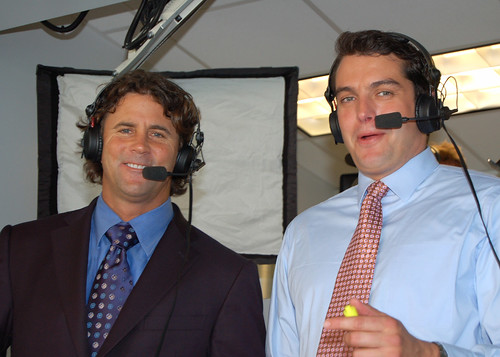

 Predicting the Major League Soccer champions days before the new season begins is an unenviable task.
Predicting the Major League Soccer champions days before the new season begins is an unenviable task.
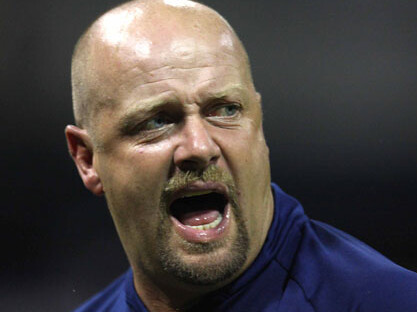


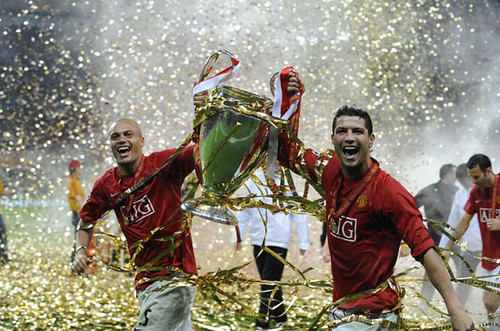

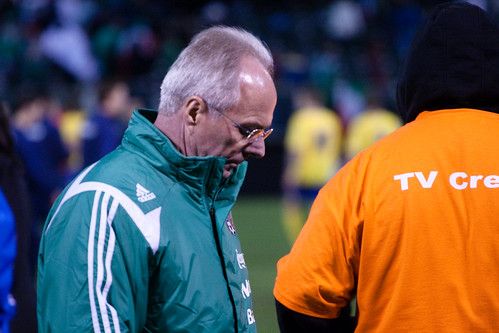

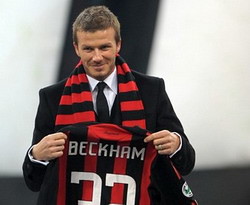

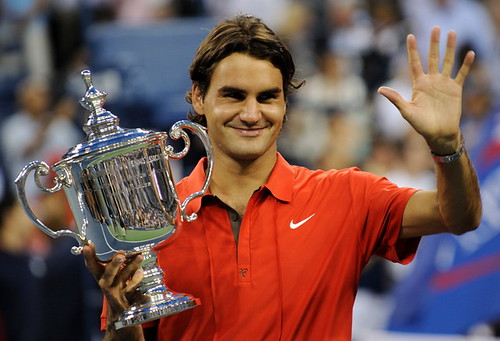
.jpg)